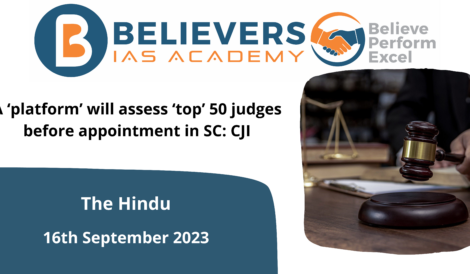High Court’s take on Marriage Act, an erosion of rights
Context
The recent order by the Madhya Pradesh High Court has stirred significant concern regarding the interpretation of laws surrounding inter-faith marriages, specifically under the Special Marriage Act, 1954.
- This ruling has the potential to undermine the core objectives of the Act, which is intended to provide a legal framework for inter-religious marriages in India.
- The order arises from a petition by an inter-faith couple seeking police protection, which the court denied, questioning the validity of their impending marriage.
- This decision not only affects the couple in question but also poses a broader threat to the legal and social acceptance of inter-faith marriages in India.
Relevance:
GS-02 (Government policies and interventions, Social empowerment, Fundamental Rights)
Dimensions of the Article:
- The Background
- About the Special Marriage Act
- Challenges
The Background
- The case in question involved an unmarried Hindu-Muslim couple who approached the Madhya Pradesh High Court seeking protection due to threats from societal and familial sources.
- The High Court, however, deviated from the usual practice of assessing the threat to the petitioners and instead questioned the validity of their potential marriage under the Special Marriage Act.
- By denying police protection, the court essentially challenged the couple’s right to choose their partner, thereby undermining the progressive jurisprudence developed around the right to personal choice in marriage.
About the Special Marriage Act
The Special Marriage Act, 1954, is a legislation designed to facilitate inter-faith and inter-caste marriages in India.
- Objective: The Act aims to provide a secular legal framework for marriages, allowing individuals of different religions or castes to marry without converting to each other’s faith.
- Scope: It applies to all Indian nationals irrespective of their religion, caste, or creed, ensuring that the marriage is legally recognized across India.
- Marriage Registration: The Act mandates the registration of marriages, which includes a 30-day notice period to allow for any objections. This period can, however, lead to harassment and societal pressure on couples.
- Prohibited Relationships: Section 4 of the Act excludes marriages between individuals who fall within the prohibited degrees of relationship, ensuring the prevention of marriages among close relatives.
- Protection of Rights: The Act protects the rights of individuals choosing to marry outside their community, providing them with legal recognition and security.
- Legal Precedents: Various court judgments have reinforced the right to marry a person of one’s choice as a fundamental right, emphasizing personal liberty and autonomy.
- Challenges: Despite its progressive nature, the Act faces challenges in implementation due to societal opposition, legal hurdles, and the misuse of procedural requirements.
Challenges
- Misinterpretation of the Law: The court’s questioning of the validity of inter-faith marriages under the Act misinterprets the law’s intent and provisions, which aim to facilitate such unions.
- Threat to Personal Liberty: By not granting police protection, the court failed to safeguard the couple’s fundamental rights under Article 21 of the Constitution, which guarantees the right to life and personal liberty.
- Societal Vigilantism: The order comes at a time when inter-faith and inter-caste marriages face significant societal opposition, often fueled by right-wing propaganda and vigilantism.
- Legal Precedents Ignored: The court disregarded established legal precedents that prioritize individual autonomy and the right to choose one’s partner, as seen in cases like Shafin Jahan vs Asokan K.M.
- Procedural Missteps: Instead of focusing on the immediate threat to the petitioners, the court delved into the potential validity of their marriage, which was not the primary concern of the protection petition.
- Impact on Jurisprudence: The ruling undermines the progressive jurisprudence that has evolved to protect the rights of individuals in inter-faith and inter-caste relationships, reversing the gains made in this area.
- Dilution of the Act: By misapplying the provisions of the Special Marriage Act, the order dilutes the Act’s intent to provide a viable legal avenue for inter-religious marriages.
Way Forward
- Judicial Clarification: The Supreme Court should clarify the provisions of the Special Marriage Act and reinforce the right to marry a person of one’s choice, irrespective of religion or caste.
- Training for Judges: Judicial officers need training on the interpretation of laws concerning personal liberty and inter-faith marriages to avoid misinterpretation and ensure protection of fundamental rights.
- Strengthening Legal Frameworks: Strengthen the legal frameworks to protect couples in inter-faith and inter-caste relationships from societal harassment and violence.
- Public Awareness: Conduct awareness campaigns to educate the public about the rights provided under the Special Marriage Act and the importance of respecting individual choices in marriage.
- Police Protection Protocols: Establish clear protocols for providing police protection to couples facing threats due to their relationship, ensuring their safety and security.
- Amendment of Procedural Requirements: Reconsider the 30-day notice period requirement under the Special Marriage Act to prevent misuse and reduce the risk of harassment.
- Encouraging Inclusivity: Promote an inclusive societal outlook that respects diversity and the right of individuals to choose their partners, fostering a more accepting environment for inter-faith and inter-caste marriages.
Conclusion
The recent order by the Madhya Pradesh High Court highlights significant issues regarding the interpretation and application of the Special Marriage Act. By questioning the validity of an inter-faith marriage and denying protection to the couple, the court has set a concerning precedent that undermines the objectives of the Act and the fundamental rights of individuals.
- To safeguard the principles of autonomy, privacy, and liberty, it is essential to address these challenges through judicial clarification, public awareness, and robust legal protections.
- Upholding the spirit of the Special Marriage Act is crucial for fostering an inclusive and accepting society that respects individual choices in marriage.




